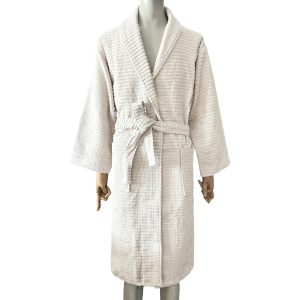Sustainable practices can significantly affect the quality and performance of towels, often leading to improvements in durability, comfort, and overall value. Here’s how adopting sustainable practices impacts towel quality and performance:
1. Material Quality
- Organic Fibers: Towels made from organic cotton or bamboo are often softer and more absorbent due to the high quality of the natural fibers used. Organic cotton, for instance, can be grown in conditions that promote longer, stronger fibers compared to conventionally grown cotton.
- Eco-Friendly Alternatives: Some sustainable towels use innovative materials like recycled polyester or Tencel, which can offer comparable or even enhanced performance attributes like moisture-wicking and softness.
2. Production Techniques
- Reduced Chemical Use: Sustainable production often involves fewer chemicals and dyes, which can result in towels that are gentler on the skin and less likely to cause irritation. This also means less chemical runoff that could potentially harm the environment.
- Energy and Water Efficiency: Many sustainable production processes use less water and energy. For instance, some factories employ advanced technologies that recycle water and reduce waste, which can indirectly improve the quality by maintaining consistent production conditions.
3. Durability
- Longer-Lasting Materials: Sustainable towels are often designed with durability in mind. Natural fibers like organic cotton or bamboo are chosen for their strength and longevity, which can result in towels that withstand frequent washing and daily use better than their conventional counterparts.
- Quality Control: Brands committed to sustainability often maintain higher quality standards, which can lead to better-constructed towels that hold up well over time.
4. Performance
- Absorbency: High-quality sustainable materials, such as organic cotton and bamboo, generally offer excellent absorbency. Bamboo, in particular, has natural moisture-wicking properties that enhance its performance as a towel.
- Softness and Comfort: Towels made from sustainably sourced materials often feel softer and more comfortable. This is partly due to the focus on high-quality fibers and manufacturing processes that prioritize the final product’s feel.
5. Environmental Impact
- Biodegradability: Many sustainable towels are made from natural fibers that are biodegradable, reducing their environmental footprint compared to synthetic alternatives. This means that at the end of their lifecycle, they will decompose more quickly and with less environmental impact.
- Reduced Pollution: Sustainable production methods often generate less pollution and waste, contributing to a cleaner environment. This can indirectly impact the quality of towels by reducing exposure to pollutants during manufacturing.
6. Consumer Perception
- Enhanced Brand Trust: Towels produced with sustainable practices often benefit from positive consumer perception. Customers may feel more confident in the quality and ethical production of sustainable towels, leading to increased satisfaction and perceived value.
7. Innovative Features
- Functional Enhancements: Sustainable brands are often at the forefront of innovation, incorporating features like quick-dry technology or antimicrobial properties into their products. These features can enhance performance while maintaining eco-friendly principles.
In summary, sustainable practices in towel production can lead to high-quality, durable, and high-performance products. By focusing on environmentally friendly materials and processes, sustainable towels often offer benefits that enhance both their functionality and overall value.




















